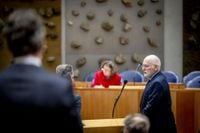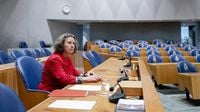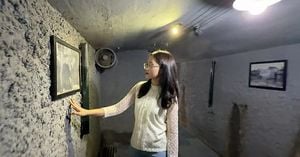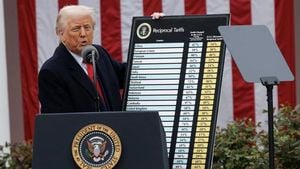In a politically charged atmosphere, Minister Marjolein Faber of Asylum and Migration (PVV) is set to debate alone with the House of Representatives today, April 2, 2025, regarding her refusal to approve royal decorations for five volunteers at the Central Agency for the Reception of Asylum Seekers (COA). Prime Minister Dick Schoof, who initially planned to skip the debate, will now attend following substantial pressure from opposition parties.
The debate is scheduled to commence at 12:15 PM after being delayed earlier due to Schoof's absence. The opposition expressed significant dissatisfaction with the Prime Minister's decision to not be present, arguing that his absence undermines the unity of the cabinet. SGP leader Chris Stoffer criticized Schoof's initial decision, labeling it a "disgrace to parliament." The opposition intends to press Schoof for clarity on how Faber's actions align with the cabinet's policy unity.
Faber has publicly stated her full support for the signatures of Schoof and Interior Minister Judith Uitermark (NSC) on the royal decorations, asserting in a letter to the House, "I am keen to emphasize that I am 100 percent behind the decision of the Prime Minister and that there is therefore complete unity of cabinet policy." This statement came after a tumultuous day where Faber faced intense scrutiny during Question Time for her refusal to sign the nominations.
Despite her assertions of unity, there remains skepticism among opposition and coalition members regarding her position. Many believe that Faber's refusal to sign the nominations is a direct affront to the volunteers who dedicate their time to assisting asylum seekers and helping them learn Dutch. This sentiment is echoed by members of the coalition parties, including NSC and BBB, who view the contributions of these volunteers as vital to society.
Faber's stance has sparked significant backlash, with various opposition leaders demanding apologies and expressing disappointment over her handling of the situation. CDA leader Bontenbal condemned Faber's attitude, insisting on accountability, while ChristenUnie leader Bikker described her letter as "frankly disappointing." The SP's Dijk highlighted the need for Faber to reconsider her position, questioning, "Will Faber now also sign for the ribbons of five volunteers?"
The controversy surrounding Faber's refusal to endorse the royal decorations, an annual tradition recognized before King's Day, has led to discussions about the integrity of cabinet policy. Critics argue that Faber's differing opinion from Schoof violates the principle that ministers should present a united front on cabinet decisions. This principle was notably highlighted in 2021 when a similar public disagreement led to the dismissal of then-State Secretary Keijzer.
Faber, however, maintains that her decision not to sign does not reflect a disagreement with the Prime Minister. In her letter, she expressed regret that her reasoning for not signing had not been adequately understood during the Question Time. She stated, "This apparently did not come across sufficiently in the question hour today. I have also too often pointed to my considerations for not signing the nominations, and I regret that."
As the debate unfolds, the opposition is poised to introduce a motion of no confidence against Faber, contingent on her performance during the discussions. The outcome of this motion heavily relies on how Faber articulates her stance and whether she can convince the opposition of her commitment to cabinet unity.
Political analysts have noted that the pressure on Schoof to attend the debate reflects the heightened tensions within the coalition, as the Prime Minister had previously canceled a visit to Belgium to participate in the discussions surrounding Faber's actions. His eventual decision to attend was seen as a necessary move to restore confidence in his leadership and the cabinet's cohesiveness.
Amidst the political turmoil, the central question remains: Can the cabinet effectively communicate a unified policy position? As political reporter Frits Wester pointedly observed, Faber's refusal to sign raises critical questions about the cabinet's unity. "But does she regret that she didn't sign? And would she sign next time?" If her answers to these questions are negative, the opposition may argue that the cabinet lacks a cohesive voice, a fundamental requirement of effective governance.
The events surrounding this debate underscore the delicate balance of power and responsibility within the Dutch government, particularly as it navigates complex issues like asylum and immigration. As the clock ticks down to the debate's resumption, all eyes will be on Faber and Schoof to see how they address the concerns raised by both the opposition and their coalition partners.
In conclusion, today's debate will not only test Faber's political acumen but also serve as a litmus test for the current government's ability to maintain unity in the face of dissent. The ramifications of this discussion could have lasting effects on the cabinet's stability and public perception.







